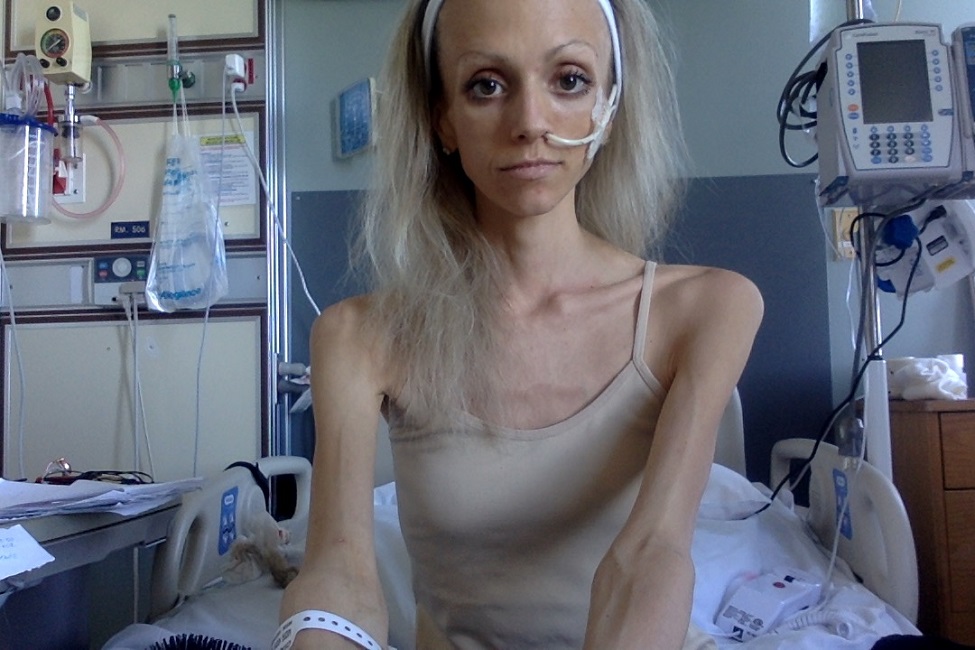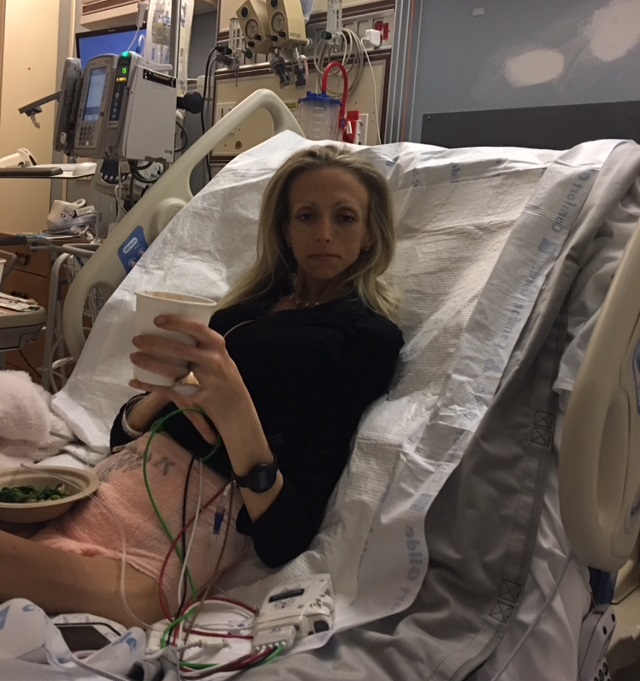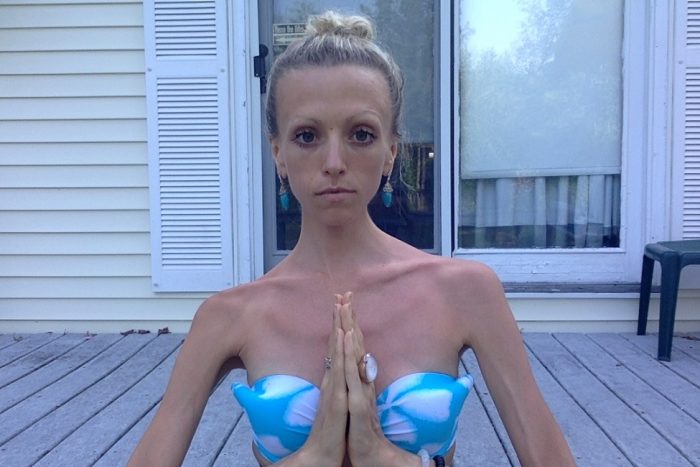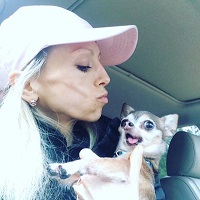*Warning: Potentially triggering images below.
~
Nurturing your body and healing your soul sounds nice—doesn’t it?
To say that I have been dealing with an eating disorder for “the past five years” may be a little untrue.
It turns out that I have been controlling my food for a great deal of my life. It started small when I was very young—I remember not eating all of my dessert on purpose so that I could have more for “later.” I literally used to hide my ice cream bowls in this little vanity that my sister and I had in our room.
It hasn’t been until recently that I’ve been able to recognize this and see how big of a role those fears and beliefs play in my eating disorder.
But this reality became more clear to me in the past year. I was in the darkest and most depressed stage of my life—I had been in a series of different hospitals and programs to help my eating disorder and my “irrational” thoughts (something most doctors and program leaders will call them) caused by the eating disorder.
After spending a greater part of fall and winter in bed, I decided to pick myself up by the bootstraps and get my life back. I did this by starting to exercise again, taking more hours at work, and creating a plan to leave the program I was at. Eventually I was able to leave and come back home to New England. Things felt better than before, so I was confident that I was slowly getting rid of my eating disorder.
I started regularly practicing yoga, biking, hiking, and swimming again—all things that I used to love to do. I also started eating healthy again; at first, this was good, then the healthy thing started to turn into healthy but not really consuming anything. I got so into the idea of not wasting, not being a consumer, and not being like the rest of society (something I still value) that I limited my food intake to the point that I was too weak to practice yoga. I was also in the midst of becoming a yoga teacher and had to stop.
Eventually, I lost sight of all of the things that I loved and that were nourishing to me: health, yoga, hiking, biking. In January, I got to the point where I was so confused about what to eat and do with myself that I started digging through trash cans for food. Why I started to do this I still don’t understand, but I think my subconscious was focused on not taking in too much and not wasting anything.
For a good month, I fed myself on dumpster food and items that I found in trash cans—how I was able to do this as a vegan is beyond me. I’m sure the thought of this is revolting to anyone who reads it, and part of me would’ve had that same reaction, but the other part of me thinks, “What makes me so much better than anyone else who actually has no choice but to eat out of the dumpster?”
Perhaps my inner Buddha, who only wants to understand others and have compassion for all, came into play. I put myself through that suffering to sincerely understand. I can look back and have compassion for myself—a 12-year-old girl stuck inside the body of a 27-year-old woman who is so utterly confused about how to nourish herself because of all of the messages from society, programs, and doctors. I looked to the trash for some answers, for some form of comfort, and in a way it provided me with that. There was comfort in the moments when I found certain foods, like when I scored a good, clean, uneaten salad. One time I found a whole eggplant and thanked the gods for providing!
Yet, when I lifted myself out of the side of the dumpster and came back into the daylight to look upon the world around me, reality set in and I felt ashamed. Eventually, because I lived in such a small town, people started to notice and I was issued several no trespassing summonses. This scared me and made me believe that what I was doing was wrong—a message that our society loves to inflict on us.

My mum and dad came up from their home in Florida to help me at the beginning of February. The first thing they did was bring me to the ER and ask to have me put on meds—something I had wanted to stay off of and had successfully done for almost a year. Even now, I have an internal battle over the idea of medication for things like anxiety and depression because I am unsure if they really work or not. It was hard to know if it was the medication that helped me be a little less anxious or the fact that I was now living in the comfort of my parent’s home, surrounded by family.
My mum stayed with me in my apartment and we spent the next few months together. Things were looking up for a while; we kept a list of my accomplishments, like “five days without eating out of the trash can”—simple things like that satisfied me and kept me going. As good as some things were, my weight started to drop drastically, even though I was consuming what felt to me like a good amount of food. By the end of April, I was so weak that walking was difficult, and at one point my mum even had to carry me on her back up a flight of stairs to a therapist appointment.
In late May, I gave in to all of the suggestions that my doctors, family, and therapists had given me and went to the hospital. I had resisted going because of past trauma with the medical field and my own personal beliefs about health and holistic healing. Sure enough though, the ER doctors admitted me and set me up on IVs right away.
Before going into the hospital, my parents and I talked about my being there for just a few days—in order to get more stable—instead, I was in the hospital for a month. In that time, I had a blood transfusion, was put on a feeding tube, and almost put on life support. There was one day I was so sure I was going to die that I actually called my mum and screamed at her, begging her to drive faster as she was on her way to the hospital and I didn’t want to die alone. There were several nights that my heart stopped, and I was constantly told that I was the “sickest patient in the hospital.”
I never believed it.
There were aspects of my time in the hospital that were positive, and aspects that were negative. I tried as hard as I could to stay true to myself and my values, and the program directors were really good about working with me, in terms of my vegan diet. My mum—god bless her—would bring in wonderful foods on a regular basis and encourage me to nourish myself. There were amazing nurses who came to me at any moment that I needed support, and even helped me wipe my own ass when I was too weak—and yes, I was even in diapers at one point. There were a few doctors who I really connected with, and who understood me and truly made me feel like they cared and wanted me to heal.
On the other hand, there were some nurses and doctors who weren’t so nice and didn’t seem to care, which is understandable. I surely didn’t expect to get along with and love everyone.
They wanted me to take so many different pills for anxiety, or liquids to make me poop. As I said before, I am not a proponent of medication and certainly did not want to blindly let them pump me full of pills as I was already being pumped full of their feeding tube formula. I worked out an agreement with them where I could just take a whole food, plant-based multivitamin and a few additional vitamins. And while I am a big believer in getting your vitamins and nutrients from the food you eat, I realized that I had denied myself that—to the point that I was admitted into the hospital at 55 pounds. I’m grateful that they suggested I take the multivitamins and appreciate that they allowed me to take one that was in line with my ideals. But I also have every intention of using food for nutrients as a regain my strength.
The one issue that I struggled with most during my stay was the feeding tube formula. When they put the tube up my nose—and my god, I can’t describe how painful and uncomfortable that was—I didn’t think to ask what would be flowing through it, mostly because I had been pumped full of meds and was kind of out of it. Eventually, I thought to look at the formula and discovered that milk and soy were the main ingredients—two things I never would’ve included in my diet beforehand.
The soy I could have taken, but as a proud vegan, the milk was so difficult to digest—emotionally, more than physically. I begged to have the tube removed. A part of me recognized that the tube was saving my life, but I still didn’t feel right. Even in this state, I did my own research and found a vegan feeding tube formula that was made from whole foods, like peas, quinoa, and kale. After several weeks, I was able to come up with enough money to order the formula, as the hospital refused to consider an alternative and my insurance did not want to pay for it as there was “already a sufficient formula in place.”
Believe me, I recognized the dichotomy here. This tube was saving my life, and even though I used to eat out of trash cans, here I was complaining about a milk-based feeding tube formula. I get it, but it still felt wrong.
After almost a month in the hospital, my team and I met and came to a decision: I would be released at the beginning of July and go directly to an outpatient eating disorder program. But the next day, a new doctor came in and said, “Here’s the plan—your time is up. You’re being released today.” This was a complete 180 from what the doctors had told me previously. I was in shock and felt emotionally unready to go home; I had planned on being there 10 more days before returning to the real world and doing the hard work of getting back to my life and healing.
They pulled out my tube and sent me on my way. The next 10 days at home were blissful. I had such a great appreciation for simple things like being able to walk freely (they had me on bed alarms in the hospital), being able to go to the bathroom on my own, eating wonderful, nourishing foods on my own, washing my hair, walking in the garden, and smelling fresh air. At this point, everything felt like it was on an upward and forward movement. I had nurses coming to my house three times a week to check on me and take vitals and blood. My parents and I were working well together, and I felt good.
Then, I was struck by a negative feeling in my gut—I still had to enter an outpatient program.
I went in for an intake on July 2nd, under the impression that they’d evaluate me to see if I was a “good fit.” Instead, they asked me to start immediately by eating lunch—talk about a loss of control. My mum said I could either submit and succumb or I had to call a taxi and find other living arrangements, which is something she literally said on a daily basis.

The program also has positive and negative aspects. It forces me to sit and think about my feelings and really work through the healing process. I have found my inner artist again and reconnected with my creative side. But the negative aspects are similar to the hospital in that they don’t honor veganism and even further, they give me the food to eat. I’m often looking at a plate of things that my body doesn’t agree with, like cookies filled with sugar and chips lathered in grease and salt. If I don’t eat 100 percent of the food, I’m given one option—drink Ensure, a nutrition drink meant to help you gain and maintain weight. Nothing against the company, but I think Ensure is crap.
My food choices have become about eating the lesser of two evils. On top of that, my eating disorder still screams at me, “I’m f*cking full Lexie. No more!” I’m only about a week in and I already want out, not because of the hard emotional work—that I can do. It’s the hard food stuff that’s more difficult. Part of me tries to rationalize or at least assure myself, “Your thoughts become your reality…your thoughts become your reality,” so I constantly try to think as I am eating, “This will have no impact on me.” In reality, it may not, but it still doesn’t feel right to me.
A few days into the program, I met with my doctor and my therapist, who decided that I would have to be confined to a wheelchair while at the program, which means no more walking to the bathroom. My parents were also told to buy or rent a wheelchair I can use while at home. In the same meeting, I was struck by my doctor’s lack of compassion when she turned to me and said, “You can’t save animals by being vegan.”
The only good that I can see coming from these recent changes is that being in a wheelchair forces me to sit and reflect. It also forces me to be more compassionate and understanding toward other people, especially those who are truly confined to a wheelchair, for reasons unlike mine.
At this point, I have to continue to tell myself that the universe has put me here for a reason—to teach me a lesson. What that lesson is is still a bit unclear, but parts of it are making themselves known day by day. Muhammad Ali said, when talking about training, “I hated every minute of it, but I said, ‘Don’t quit, suffer now and live the rest of your life as a champion.'” That is how I am trying to look at this time in my life.
I may hate every minute of sitting at that table, eating food that I don’t see as nourishing and healing. I may hate every minute that I have to sit in a room full of negativity while I want to be sitting outside and focusing on healing and forward movement. But if I can work through the hard stuff and conquer it, then I can truly conquer my eating disorder and live a life that’s full and vibrant.
And even more important than that, perhaps I can live a life helping others who are in similar situations, and push for better solutions and alternatives—like a vegan treatment program that offers meal replacements made from whole foods and meal alternatives for the times your belly can’t stomach it all. Again, I’m working to find the message and the truth in it all, trying as hard as I can to remain true to myself and heal in a positive way.
~
Relephant: The Simple Buddhist Trick to being Happy.











Read 20 comments and reply